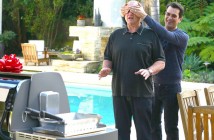April 1, 2015, 10:00 p.m. (EST), FX
Innocence is a fleeting thing, something that dissipates over time. The more contact we have with the world, the less of it we tend to possess. The more we learn, the more we understand the pain and cruelty the world can offer, the more we harden ourselves or teach ourselves to cope. Innocence is almost always seen as a positive in our culture, a thing to be treasured, a thing to be preserved. But from a different angle, just slightly askew, innocence is akin to ignorance. If all it takes to lose innocence is to learn more about what other men can do, to understand the cruelties of nature and the transitory nature of life, then innocence is really just a veil between ourselves and the real world we live in. Tonight, Paige Jennings tore off that veil, for once and for all. We have watched Paige grow up, witnessed her dawning personhood. But when she confronts Philip and Elizabeth is the moment she must leave childhood behind, somewhat. It’s the moment she begins to see how her world really works.
One of the ways we mark out the transition into adulthood is the slow realization that your parents are people too, with their own hopes and dreams, their own flaws and disappointments, their own triumphs and regrets. As a child, your parents are basically omnipotent, but as you grow, you begin to understand them as something more complex, and ultimately, something more wondrous. To do what a parent does, to be what they can be (and often must be) to a child, while also being a human being capable of mistakes, capable of selfishness, capable of anger and pettiness, and disappointment, is a titanic task. Learning who your parents are is a huge part of growing up. And in “Stingers,” Paige finally learns who her parents really are.
“Stingers” provides perhaps the most cogent reason yet for why Paige was driven to Christianity to find some semblance of sense in the world. She has felt her family was abnormal for years, but she assumed that was a problem with her, not with them. She didn’t have any relatives, her parents were always gone, they openly cared more for each other than for her. It broke Paige, in ways she is just now learning how to cope with fully. She thought the fault was in herself, but she is slowly learning it was instead in everything around her. It’s a very teenage problem, to be wracked with insecurity and then to externalize it on the world around you, to feel that everyone is conspiring to bring you down. But for Paige, it is also not far from reality. The world she lives in is broken, not of her own doing, but because of institutions that predate her and organizations that will survive after she is dead. Paige would have to be dumb not to get caught up in teenage angst. The Cold War is coming to a head, and her parents are Russian spies. Everyone may not be out to get her, but its hard to blame her for feeling that way, especially when there is a covert plot to recruit her as a Soviet spy.
Paige learns who her parents are tonight, and is immediately corrupted by what that means. She now bears their secrets. She now holds their fate in her hands. Her situation is far more dramatic than what any one of us have probably experienced (if you are a reader whose parents were spies and revealed that to you in your teens, maybe speak up in the comments?), and yet, is it so different from what we all experience? Relating to your parents as people means learning things about them they might not want others to know. Being close with your parents as more than the people who raised you often means understanding things about them you might not have wanted to know. Part of maturation is respecting and understanding that there are people outside of yourself. Perhaps the toughest part is acknowledging that your parents are among them.
These revelations, painful though they may be, ultimately amount to a choice. At some point in every teenager’s life, they hate their parents, want to get away, hope to have nothing to do with them someday. And yet, most people find themselves entering adulthood with some sense of loyalty to those who raised them, whether its due to love, respect, or guilt. But ultimately, the relationship you have with your parents as a child is one of obligation (on their part) and fealty (on yours). The relationship you have with your parents as an adult is one of choice. The Americans is frequently a show about loyalty, about who and what we are supposed to be loyal to, and whether we can be loyal to more than one thing at a time. Often, these questions pit loyalty to a larger abstraction against a concrete human. Here, Paige is forced to choose between the parents who raised her and the country she grew up in, and to some extent, her family and her faith. No one is forcing her to pull the trigger immediately, but these are considerations Paige will have to make now. They are choices that will shape the rest of her life.
Innocence is seen as always a good thing, and similarly, so is truth. The latter, at least, has more to offer in terms of integrity and morality. And yet, truth can destroy the strongest of structures, can tear down the closest of bonds. The truth won’t always set you free. Sometimes it shackles you to a version of reality you want nothing to do with. Sometimes it drags you out of the cave and into a sunlight you’re unprepared for. Truth, unlike innocence, may be for the best in most situations. But the truth won’t always set you free. Sometimes, it will lock the doors.
The Roundup
- “Doesn’t Matthew still live here?” “I don’t know. I don’t know.”
- “We can make him go home. Do you want us to?” “…No.”
- “I need to know the truth. If you love me, if you really love me, just tell me the truth.”
- “We work for our country. Getting information. Information that they…couldn’t get in other ways.”
- “If you do tell anyone, we will go to jail. For good.”
- “You’re ok?” “I don’t know. Do you hate me?”
- “Things just…fell apart.” “An apple with a worm in it. Trust.”




